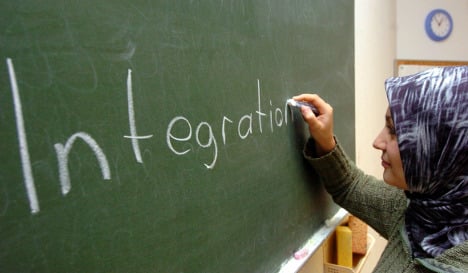A year ago a Turkish entrepreneur set up a kebab shop just opposite my favourite baker near the entrance to the train station. At first, there were Anatolian delights like Döner and Börek, then he expanded to include newspapers, coffee and grilled chicken. Finally, he ended up selling the classic Berlin fast food Currywurst. Last week the shop was shut.
A sad development for him personally, but his business plan was not exactly brilliant: my neighbourhood Grunewald is not exactly famous for its thriving Turkish community – indeed many of its elderly German residents would probably be itching to call the police if they saw a young Muslim-looking man roving the streets.
Of course, the name Thilo Sarrazin has been on everybody’s lips in our sedate and resolutely conservative ‘hood lately. Attacking the alleged unwillingness of Muslim immigrants to integrate into German society, the disgraced Bundesbank board member has become a kind of martyr, a supposed truth-teller; a hero in the struggle against suffocating political correctness apparently on the rise in Germany. But we know that the story is a little more complex than that, don’t we?
Sarrazin’s controversial book, Deutschland schafft sich ab – Wie wir unser Land aufs Spiel setzen, or “Abolishing Germany – How we’re putting our country at jeopardy,” tries to use statistics to make a variety of contradictory arguments.
But in the end it is not clear whether he is trying to tell us something about intelligence and race, about education and finance, or about the science of Germany’s national decline. Frankly, it’s not unlike the jumble of latent xenophobia often found down at your local pub.
But I don’t believe Sarrazin is a racist, merely a misguided troublemaker. He is also extremely naïve.
Sarrazin’s true error was not to offend the Muslims and the Jews – any buffoon can do that – but to imagine that he was going to be the vanguard of a movement asking suppressed questions about the meaning of immigration in Germany.
As soon as he has been formally sacked from the Bundesbank, he will have fulfilled his function: the creation of outrage. He will sell books but will not convince the political establishment that it needs to change.
But the leadership of the Social Democratic Party would be stupid to follow the central bank’s lead by also expelling Sarrazin. If I understand my (borrowed) copy of the book correctly, he is primarily concerned with the so-called underclass. Immigrants, as we know, form a significant chunk of this group, but then so do Germans who can trace their Teutonic roots back to the Middle Ages.
One section of the Sarrazin book calls for the withholding of welfare payments if parents do not send their children to school. That is the punitive Sarrazin, and you can love him or hate him. His underlying case, however, is that the country’s underclass should be opened up and made more socially porous. Work has to have meaning; individuals have to take their lives into their own hands. This, surely, is a core message of the modern Social Democratic Party. Sarrazin is not simply some kind of right-wing fanatic.
Perhaps he would have been given more credit if he hadn’t unfairly decided to single out one group (Muslims) and accepted that plenty of Arab and Turkish immigrants do indeed make determined efforts to fit into German society.
I have written before about a friend, Ayfer, who is a fashionable hairdresser in Berlin’s fancy Mitte district. One of many children from a Turkish immigrant family, she left school early but discovered she had a passion for hair. Fortunately Germany’s adult education system, the so-called zweiter Bildungsweg, is far superior to anything Britain has, and she eventually got her Abitur school diploma. After stints at Vidal Sassoon and Tony & Guy she eventually claimed her Meisterbrief.
She then decided to open her own salon, but the bank rejected her as a bad credit risk being single, female, a hairdresser, and, of course, Turkish. Ayfer’s parents had to give up their savings – intended for their retirement in Turkey – so that she could open the salon. Today she employs four Germans and is a German citizen herself.
What does that show us? That the German system really does offer chances for the ambitious – but that it can also throw up plenty of obstacles. And that you don’t have to know a single line of mediaeval poetry by Walter von der Vogelweide in order to commit yourself – as Ayfer’s parents did – to a wholly German future. These are the mechanisms of social integration. They have to be understood and refined but we are still a long way from Sarrazin’s nightmarishly bleak vision of the future.
Let’s remove the hysteria from the debate, look at the problems unblinkingly, and see what can be improved. Every major European society has similar immigration and integration issues. It is time that Germany exchanged experiences with some its neighbours and opened up a bit.
It is no use pretending that everything is perfect, but neither should a particular group of immigrants be made the scapegoat for all the problems.



 Please whitelist us to continue reading.
Please whitelist us to continue reading.
Member comments